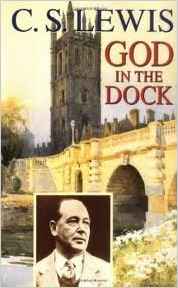I’m of the decided opinion that Christian faith is under attack in our nation. I’m also convinced that the influence of that faith in the public sphere has declined precipitously in the last seven years (I wonder what that coincides with?).
 Yet there is another angle of vision on this outward decline of which C. S. Lewis aptly reminds us. In one of his short essays found in God in the Dock, “The Decline of Religion,” he offers his perspective on that perception.
Yet there is another angle of vision on this outward decline of which C. S. Lewis aptly reminds us. In one of his short essays found in God in the Dock, “The Decline of Religion,” he offers his perspective on that perception.
He wrote this essay just after WWII, but it is just as applicable today. First, he examines the perception of religion’s decline by looking at outward manifestations, such as chapel attendance at Oxford:
The “decline of religion” so often lamented (or welcomed) is held to be shown by empty chapels. Now it is quite true that chapels which were full in 1900 are empty in 1946. But this change was not gradual. It occurred at the precise moment when chapel ceased to be compulsory.
Lewis notes that some students used to attend only because it started later than the roll call before which they would have had to appear if they didn’t go to chapel. As a result, those sixty students never came back; “the five Christians remained.”
Therefore, this was not a genuine decline, but rather an exposure of what lay beneath the surface: “The withdrawal of compulsion did not create a new religious situation, but only revealed the situation which had long existed.”
But wasn’t England a Christian nation? Didn’t it have a moral code based on its solid Christianity? Lewis tackles that as well:
One way of putting the truth would be that the religion which has declined was not Christianity. It was a vague Theism with a strong and virile ethical code, which, far from standing over against the “World,” was absorbed into the whole fabric of English institutions and sentiment and therefore demanded church-going as (at best) a part of loyalty and good manners as (at worst) a proof of respectability.
For the first time, Lewis explains, accurate observations could be made: “When no man goes to church except because he seeks Christ the number of actual believers can at last be discovered.”
While this “decline” of outward religiosity was a problem for how the nation of England might comport itself, it did draw a clear line in the spiritual sand. Lewis continues,
The decline of “religion” is no doubt a bad thing for the “World.” By it all the things that made England a fairly happy country are, I suppose, endangered: the comparative purity of her public life, the comparative humanity of her police, and the possibility of some mutual respect and kindness between political opponents.
But I am not clear that it makes conversions to Christianity rarer or more difficult: rather the reverse. It makes the choice more unescapable. When the Round Table is broken, every man must follow either Galahad or Mordred: middle things are gone.
The upside, then, is that there is a definite demarcation line between God’s righteousness and the way of the world. People will see that choice more clearly. More genuine conversions may result.
Lewis concludes his essay by commenting on how the Oxford Christians, at least in 1946, had not yet had to face a bitter opposition: “The enemy has not yet thought it worth while to fling his whole weight against us. But he soon will.” He says that every strong Christian movement, while welcomed at first, will in the end face hatred from those who are “offended” by its bold stand for truth and morality.
Dislike, terror, and finally hatred succeed: none who will not give it [Christian faith] what it asks (and it asks all) can endure it: all who are not with it are against it. . . . To be on the Christian side would be costing a man (at the least) his career.
What will make that hatred all the more confusing to the mass of people watching it being played out is that the attack will come from those who themselves are claiming to be Christian. As Lewis puts it, “But remember, in England the opposition will quite likely be called Christianity (or Christo-democracy, or British Christianity, or something of that kind).”
 What are we witnessing in America in our day? A growing hostility toward the absolutes rooted in Christian belief. A bitter opposition charging us with being bigots, haters, etc. And many of those hurling the charges are claiming the mantle of the true Christianity—the one that loves everyone and doesn’t judge. We are labeled intolerant and reactionary; they are the new and more understanding advocates for what Jesus really meant.
What are we witnessing in America in our day? A growing hostility toward the absolutes rooted in Christian belief. A bitter opposition charging us with being bigots, haters, etc. And many of those hurling the charges are claiming the mantle of the true Christianity—the one that loves everyone and doesn’t judge. We are labeled intolerant and reactionary; they are the new and more understanding advocates for what Jesus really meant.
I wonder how Lewis would view the current state of America where same-sex marriage and abortion are the law of the land. I wonder how he would respond to the demand that public restrooms should be open to all without regard to the particular sex we are born into.
One thing is pretty evident, though, from his analysis: if the line between what is genuinely Christian and what is not was clear in his day, it is so much clearer now. And while the decline of the role of Christianity in our public affairs is a sad testimony to the state of the nation, whenever real Christian faith comes into view, it will draw those who are seeking forgiveness and a new life.
The dark cloud descends upon us, but in the darkness, the Light becomes even brighter.
